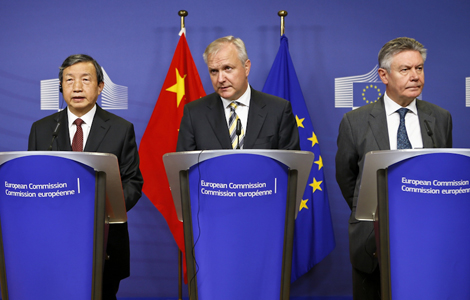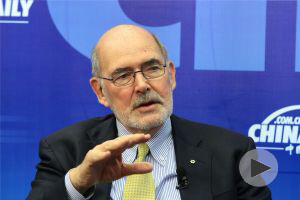China regulates officials working in enterprises
Updated: 2013-10-31 04:19
(Xinhua)
|
||||||||
BEIJING - China on Wednesday issued rules to regulate incumbent and retired officials working in various establishments in order to root out irregularities and prevent corruption.
The rules, issued by the Organization Department of the Communist Party of China (CPC) Central Committee, are based on existing laws and regulations on civil servant management and the Party's integrity rules.
Incumbent officials, including those who have not completed retirement procedures, should not hold concurrent posts or work full-time in enterprises, unless the officials' work requires that and the process is subject to strict examination and approvals, the rules say.
In order to avoid causing a conflict of interest with their prior role, former officials may not work in businesses within their former jurisdiction or engage in profit-making activities related to their former positions within three years of leaving public service, they say.
After that point, or if they want to work in enterprises outside of their former jurisdiction, they may take such posts or engage in such activity, but only after reporting to their former units.
Under the rules, officials holding concurrent posts in enterprises should not get payments, stock rights or extra profits there; they should not hold two or more posts in the companies or be reappointed for more than two terms; and the age limit for their part-time company jobs is 70.
Officials who have been transferred to work for enterprises should not retain their civil servant status before or after retirement, or be entitled to be treated as government officials.
Former or incumbent officials working for enterprises should strictly abide by laws and discipline, uphold integrity and refrain from seeking personal gains by taking advantage of their influence, and they should report their performance, expenditure and other financial statements regarding their company posts to superior departments annually, the rules say.
The CPC has paid great attention to the management of officials working for enterprises. During a rectification campaign in 2004, more than 8,000 Party and government officials above county-level were ordered to give up their part-time company posts.
Wednesday's rules expand the supervision network to cover retired officials or those under county level, said Prof. Xin Ming of the Party School of the CPC Central Committee, adding, "Negative social influence has been created due to officials illicitly working for companies."
In 2011, there were 34 retired senior government officials employed as independent directors by the top 50 companies listed on China's Shanghai and Shenzhen stock exchanges, and nearly 1,600 former officials worked for A-share companies, nearly 500 of whom were independent directors, a survey showed.
Xinhua reporters found that currently seven of 48 independent directors at the top 10 A-share companies by market value are retired senior officials.
Former officials employed by companies have mainly worked in government departments related to auditing, taxation, finance, law and human resources.
In July, Sinotruk Hong Kong Ltd. announced the appointment of three former senior officials as its independent directors. They were promised annual pay of 180,000 yuan (about 29,000 U.S. dollars).
The three officials, including the former governor of east China's Shandong Province and the former deputy head of the State Taxation Administration, resigned amid public and media queries on August 14, 20 days after their appointment.
The public was worried about possible corruption and unfair market competition due to their influence.

 Color-blind love
Color-blind love
 Lenovo's new secret weapon: Hollywood star
Lenovo's new secret weapon: Hollywood star
 Brussels visit heralds closer trade ties for EU and China
Brussels visit heralds closer trade ties for EU and China
 Halloween gaining popularity but still sees cultural differences
Halloween gaining popularity but still sees cultural differences
 US embassy accused as 'spy hub'
US embassy accused as 'spy hub'
 Halloween beverage offers vampire experience
Halloween beverage offers vampire experience
 Lenovo launches new Yoga tablet
Lenovo launches new Yoga tablet
 Sandy anniversary
Sandy anniversary
Most Viewed
Editor's Picks

|

|

|

|

|

|
Today's Top News
US business council wants market-barriers reduced
Benefit held for NYC official’s ex-campaign treasurer
HIV epidemic needs education, not bath house bans
Survey examines education gap
Chinese cities victim of US spying scheme
Legislation to help reduce pollution
Govt pledges more housing
Halloween gains popularity in China
US Weekly

|

|





